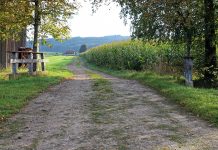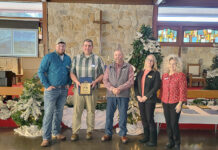The smell was sweet and unmistakable. I looked around for the source: There at the side of the road, a multiflora rose bush in full flower.
Asking my friend Abdul, “Is this where the flower from hell comes from?”
He gave me a puzzled look. We were driving down a bumpy mountain road from his native village of Istalif, Afghanistan.
“You see this white flower bush?” I asked. “The game commission gave this out all over Pennsylvania as a natural fence, but it went crazy, and now the plants have taken over entire farms.”
Again, he gave me the same puzzled look. I decided there was just too much to explain and told him to forget it.
The numerous herds of sheep, goats and cattle that wander the mountain landscape eat most green things in Afghanistan. Multiflora rose is just another snack and would probably be eaten if not so close to the road.
Rebuilding potteries. We were headed back to Kabul, the capital city where Abdul has a shop selling carpets, antiques and extraordinary reproductions of Afghan furniture.
He had taken me to visit his cousin’s pottery where we watched a kiln firing using a method that dates back 400 years, tracing its origins to some potters from Uzbekistan who somehow made their way to this mountain many centuries ago.
Their signature was the colorful turquoise glaze that made their style of pottery outstanding.
Destroyed by Taliban. During the seemingly constant wars in Afghanistan, the village was totally destroyed by the Taliban.
Now the people had returned and were trying to regain their heritage. I had been invited there to help them improve their work and regain the standard of quality that made the village famous.
Drinking water. My other agenda was to teach them how to produce the colloidal silver, clay and sawdust ceramic water filter promoted by Potters for Peace.
Although Afghanistan had many pure mountain streams, they suffered a degradation of water quality. Because of undeveloped defense mechanisms, children are the most susceptible, and worldwide, at least 6,000 die every day worldwide from the effects of waterborne disease.
A few days before, my friend Mohammad and I traveled to Jalalabad to meet with an American commander of the provincial reconstruction team to seek support to produce the water filter.
Rocky roads, literally. Nothing in Afghanistan comes easy and although we left Kabul at 5:30 a.m., we were soon stuck in gridlock. After a half hour of jammed up bumper cars, we managed to turn around and head to back toward Kabul.
The main highway was closed because of an accident in one of the many tunnels through the mountains. Our plan was to take the dirt road over the mountain.
We traveled in two SUVs with an AK47-toting guard riding shotgun in each vehicle.
Former Pa. student. Mohammad was born and raised in village about 50 miles from Jalalabad and although a graduate of Slippery Rock University, he continues to have that village boy practicality about him.
He is founder and director of a highly respected nongovernment organization whose mission was to help rehabilitate the many opium addicts in Afghanistan and to provide support for democracy, education, health and social service projects.
His organization the Welfare Association for the Development of Afghanistan is transparent, effective and highly successful.
Our plan was to have the potters of Istalif produce the filters as an income supplement and then have Mohammad’s organization test, assemble and package the filters for distribution. It would provide a much-needed vocational training component for his drug rehabilitation program.
Subsistence farming. Our two-car convoy turned off the main road, traveling through a rather poor-looking village then began the ascent up and through the mountains.
Most of the landscape was colored various shades of grays and browns. Occasionally, green fields of wheat would appear, obviously irrigated. How people could eke out an existence in this seemingly barren landscape was near incomprehensible to me. The road was rough and the scenery was amazing. My video and digital camera preserved the experience.
Four hours later, we got to the lowlands, where the farmers were harvesting their wheat crop. Their methods were antiquated, but effective. They cut the crop by hand and bound the sheaves together.
As we drove on a road along a rushing river, the fields were larger. Tractor-powered thrashing machines blew the grain onto the ground where the farmers shoveled it into bags and onto trucks headed to market.
Kabul sits on a 6,000-foot high plateau ringed by snow-covered mountains. They told me that the main roads were once lined with oak trees that formed a canopy like an umbrella. The Soviets cut down all the trees.
Later when the Taliban took over, they ruined the many grape vineyards, a source of raisins, the main cash crop in the area. Citrus fruit grows in the lower altitudes, but those orchards were also destroyed.
Much to do. The openness and friendliness of the people impressed me the most. I have promised to help get supplies for the art high school of Kabul. The kids have much enthusiasm but little to work with. They do not possess a single computer. I am hopeful that I can send a few used Macs to them.
My friend Abdul and I are planning to bring some pottery, furniture and Afghan carpets to Pittsburgh and try to find a market for the products. Maybe it would be possible to bring some students to my school, Slippery Rock University.
One thing I know for sure is that I’ll be back to Afghanistan as soon as I am able. En’Shalah! (God willing).
(Richard Wukich is a professor of art at Slippery Rock University. He and his wife Barbara raise beef cattle and Thoroughbred horses on their farm in Lawrence County, Pa. His e-mail address is rwukich@pathway.net.)
Get 4 Weeks of Farm and Dairy Home Delivered









